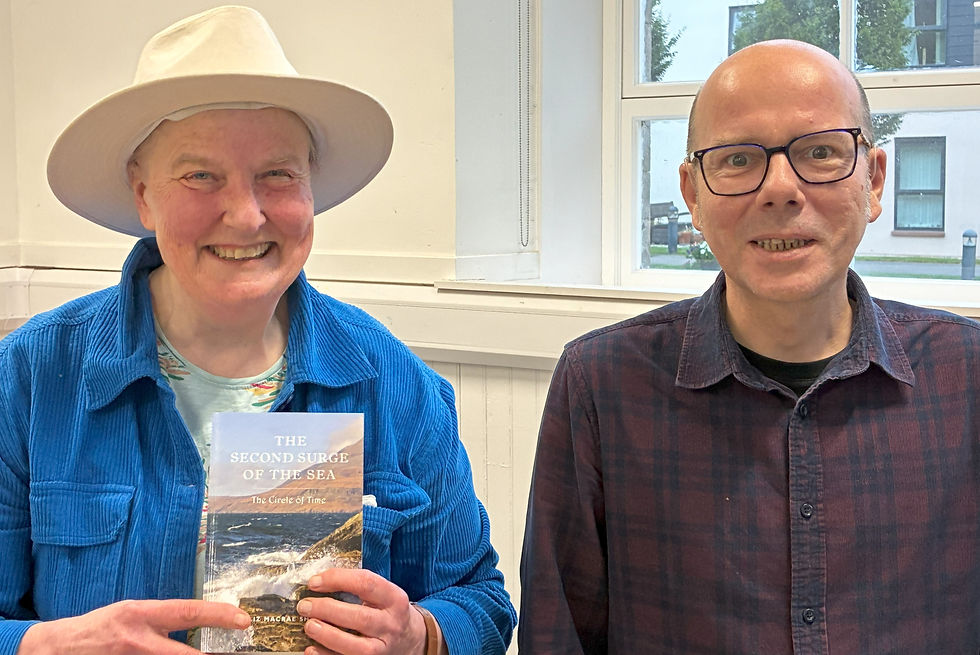'If the itch is there': Liz Macrae Shaw at the August HighlandLIT
- John Dempster

- Aug 22, 2025
- 3 min read
We were delighted to welcome back HighlandLIT member Liz Macrae Shaw to the August meeting, held at WASPS in Inverness on Monday 18.
Liz was brought up in England, but her mother was Skye-born, and Liz spent holidays on the island as a child with her grandparents. She studied history at Oxford, and then had two fulfilling careers in England, first as a history lecturer in a Further Education college, and then as a counsellor and therapist. However, she now lives on Skye, and has now published four novels based on the island and its history. Liz confesses she finds writing ‘somewhat addictive’.
Her own memory and skills feed into her work. She remembers as a child hearing stories about Skye in the early decades of the 20th century, and had an aunt who became a munitions worker in Paisley. And while she was a lecturer, she had training on working with oral history, which she found fascinating.
She spoke about, and read from her most recent book The second surge of the sea: the circle of time. One of its key themes is that ‘you can’t go back in time’, for the place you return to is not the place you once knew. It tells the story of a disgruntled teenager, Margaret banished to stay with grandparents on Skye in the 1960s - because she has an unsuitable boyfriend. Margaret draws unexpectedly close to her grandfather, who gradually shares with her the story of his life on the island before and during the First World War.
Liz introduced us to the main characters in the book (one of its prominent personalities is a dog!), and then read us its opening pages, in which Margaret and her grandfather have their initial spark of connection. It was a reading which inspired us to know what happens next!
She also spoke about the technical issues of writing the novel – notably working with two time zones, and more generally described her writing strategy. Normally it takes her three years to write a book – one, doing research (some of it at the excellent local collection in Portree Library), one spent writing, and one, editing (she has an excellent editor who is not afraid to tell her when beloved passages not integral to the book’s flow and development have to go.) Having an editor, she says, is vital: ‘you can’t do it yourself.’
And after the book is written, comes the marketing, which she focusses on in the summer months.
She usually has more than one book in progress at the same time – sometimes she feels akin to the kangaroo with ‘one joey in the pouch while pregnant with another.’
Liz also made some comments in response to questions she was asked.
She said that whereas her early books had largely been based on her own memories and family story and on historical research, now she has confidence to let the story-lines develop. She appreciates that other writers need to have a plan, but insists that creating a novel is in part an intuitive process.
Her stories ‘evolve’ as she writes – at the start, she knows how the story begins, and possibly how it ends, but not the bit in the middle. It’s ‘an organic, unconscious process.’ Ideas ‘drop into’ your head. Her characters become so real that she can hear them conversing in her head.
(Someone asked, ‘do you visualize your characters as well as hear them?’ ‘Yes,’ was the answer. But what the characters are saying is more important. And once she has a clear idea of what they look like, she visualizes them less.)
She spoke about the benefits of her standing slightly between two cultures. She had a sense in the 1960s when travelling to Skye of ‘going through a door’ from one culture to another. Then, having mixed with Skye, children she would go back to England and tell friends about her holidays as a kind of cultural ambassador. This perspective enables her to be more objective as a writer, and this has been a ‘huge advantage’ to her.
And she summed it all up neatly: ‘The whole thing is hard work. But if the itch is there, you have to write.’
We’re so grateful to Liz Macrae Shaw for coming to speak to us! Many thanks also to HighlandLIT Chair Paul Shanks who chaired the meeting, set up the room, and provided refreshments and to David Goldie who, with help from Cathy Carr (who couldn’t be with us on the night) set up and ran the IT and the Zoom session.
Watch this space for news of the date and venue of the September HighlandLIT, when the speaker will be Joanna Corrance.





Comments